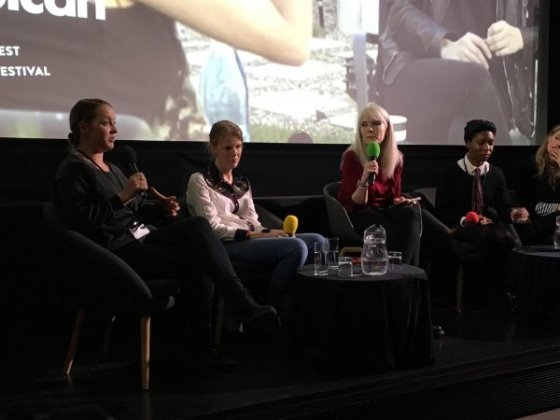Home > Reviews > Features > Play Your Gender at the Barbican
Play Your Gender at the Barbican
Wednesday 15 November 2017, by
When we talk about women in music, many of us can come up with a substantial list of female musicians we like. Many of us also don’t give much thought to the presence of women in the creative ‘process” behind their music, where a rooted misogynist culture is more apparent.
Play Your Gender, directed by Stephanie Clattenburg, really helps us pull back the curtain to see what is happening in the music industry, and how male-dominated it is when one tends to seek any female music producers out there. The documentary cleverly poses the question of whether or not what we see on the surface is really enough and highlights how female musicians are being treated by music industry stakeholders.
The film was screened as a part of the 4th edition of the Dock’n Roll Festival at the Barbican and was followed by a Q&A with Jess Partridge, Founder and Editor of London in Stereo magazine, Olga Fitzroy, an internationally acclaimed producer, Catherine Marks, a Grammy-nominated producer, Karen Shook, a well-known music journalist and Fred Macpherson, frontman of the band Spector.
In the film, we can see Stephanie Clattenburg in the director seat along with award-winning musician and producer Kinnie Starr narrating the documentary and interviewing prominent women in the industry. The case studies that are shown in the film provide worrying statistics and realities that illustrate the misogyny that underpins the music industry.
When we think of popular female musicians, how many of them are actually positioned as creators and/or producers? How many of them can we say are labelled “creators” rather than great singers/performers/the face of some brand or another? Usually very few. The film features interviews with Tegan & Sara’s Sara Quinn, the Smashing Pumpkins’ Melissa Auf der Maur, Hole’s Patty Schemel, Chantal Kreviazuk and many more of the music industry’s most talented women.
The film actually hits us with the shocking reality that only 5% of music producers out there are women, although many of the most bankable pop stars are female. In fact, only 6 women in the history of the Grammy Awards have ever been nominated for the ‘Producer of the Year’ award - none of those 6 women has ever won.
The documentary goes further by asking whether we actually care to know who wrote our favourite songs - Do we want to know whether our ‘queens and divas in the industry’ are the actual creators of their music and image? Play Your Gender in this sense leaves the viewer to ponder and think about the ‘female image’ in the music industry. The documentary follows a very well thought out direction by keeping the conversations specific and to the point and illustrating them with figures and statistics. This structure allows us to really understand the extent of the various types of discrimination that women in the industry experience even from a very young age. The women interviewed stress repeatedly that they’ve had enough of ‘sexually commodified and/or harrassed’ in order to ‘remain’ in the industry.

The screening, which was the documentary’s UK premiere, brought up many questions that were then tackled in the screen talk session, moderated by Karen Shook. Speakers made it clear that although it is promising to be able address these matters, there is a lot more work to be done to open more avenues for female music producers.
For me, one of the most interesting remarks came from a member of the audience that led me to think more deeply about the degree of ‘masculine authority’ in music industry. A fellow male musician in the audience stated that he, as a gay singer and songwriter, shares some of the same concerns as the women in the documentary:
“There were times that my producers tried to ‘masculinise’ me and sometimes they tried to put me in outfits that were quite different than what I wanted my style to be. I think this whole dilemma in the industry isn’t about being male or female but is about the hegemony of ‘masculinity and its roots’”.
Play Your Gender and the ScreenTalk afterward gave us some great behind-the-scene insights into the state of the music industry and into how much still needs to be done to properly address gender parity issues in the industry. I can’t recommend it enough, especially to those who have some sort power in this industry.
For more information on the Doc’N Roll film festival can be found here.